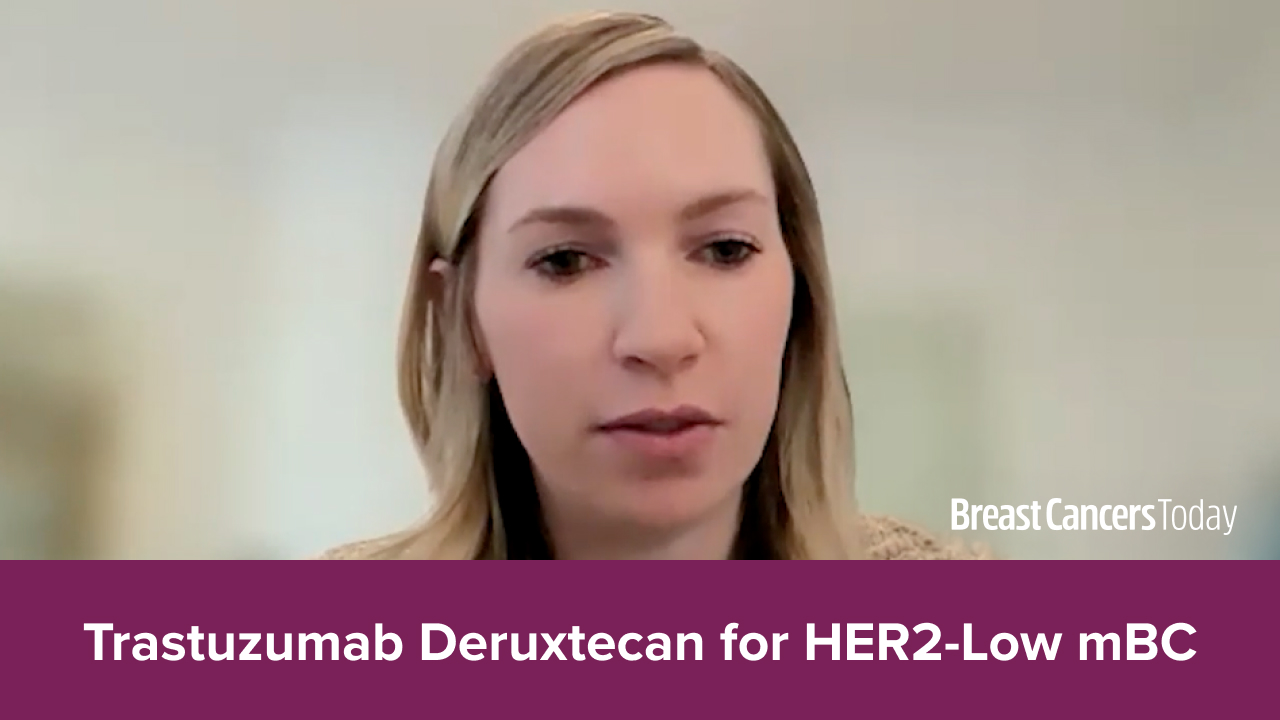Reclassifying HER2: What Oncologists Need to Know About HER2-Low and -Ultralow Breast Cancer
By Sara Nunnery, MD, MSCI - Last Updated: April 22, 2025In this interview, Dr. Sara Nunnery, director of breast cancer research at Tennessee Oncology, discusses the evolving classification of HER2-low and HER2-ultralow breast cancer, and the clinical implications of the DESTINY-Breast06 trial. She explains how precise pathology reporting is key to identifying eligible patients and offers insights into how Enhertu (trastuzumab deruxtecan) is changing treatment decisions in HR-positive, HER2-low metastatic breast cancer.
Transcript
Given the expanding role of HER2 testing at lower expression thresholds, how do you approach identifying and managing patients with HER2-ultralow disease in your own clinical practice?
Dr. Nunnery: So you introduced this mentioned this whole new concept that’s really emerged in the breast cancer world, which is this idea that there’s HER2-low and -ultralow, meaning that breast cancer patients who do not meet criteria to be classified as HER2-low—those patients can still have some levels of HER2 expression.
And we found that even those low to very minimal levels of HER2 expression are important for treatment and will respond to certain HER2-targeting antibody drug conjugates. So now patients that have hormone receptor-positive breast cancer, but HER2-low by traditional classification, we are now having our pathologists further classify their level of HER2 expression into these categories of HER2-low, meaning one plus or two plus on immunohistochemistry staining when they look under the microscope.
And to take that a step further, we have now found that some of those patients that are classified as IHC 0, meaning they didn’t have any sort of staining under the microscope, now when the pathologists look, there actually is a group of patients that are IHC 0. But if you look really closely, they do have some HER2 expression level there on staining and those are now the patients that are HER2-ultralow.
So this is a completely new concept for the pathology world and the breast cancer world. And it’s a time where we’re now having to heavily rely on our pathologists and work with our pathology colleagues to make sure we are now looking for these levels of staining on traditional pathology reports and now reporting those very nuanced detail level of staining so that us, as the medical oncologists, can now make sure we’re providing the best treatment for these patients.
How has the approval of trastuzumab deruxtecan influenced treatment decision-making for patients with HER2-low or HER2-ultralow metastatic breast cancer, particularly after progression on endocrine therapy?
I think we’re all very confident on the efficacy and data with Enhertu based on the clinical trial results from the DESTINY-Breast06 clinical trial, and these were results that were presented back at ASCO last summer, which is our national oncology conference. And this was the first trial to classify patients into HER2-low and HER2-ultralow categories and then treat these patients with Enhertu, and Enhertu was first developed as a HER2-targeting antibody drug conjugate. But we now know that it works even in patients that have these low levels of HER2 expression.
Based on the results of the DESTINY-Breast06 trial, which showed that this drug Enhertu worked better than chemotherapy for these patients with hormone receptor-positive breast cancer after their cancer is no longer responding to hormone-based treatments … based on the really positive results that that trial showed, the drug is now fully FDA approved for patients with hormone receptor positive breast cancer that are HER2-low and -ultralow. And we all feel very confident in this data. And so most of us now, and we should be, using Enhertu now in this setting and making sure we are identifying our patients that are HER2-low and -ultralow. I think that the big key is now making sure our pathologists are aware of this data and our reporting whether our patients are HER2-low and -ultralow.
It’s taking a lot of teamwork now as an oncologist, working with our pathologist to make sure we get that level of data for our patients to be able to offer this therapy for them. Because we saw with this clinical trial that Enhertu does outperform chemotherapy for these patients.







 © 2025 Mashup Media, LLC, a Formedics Property. All Rights Reserved.
© 2025 Mashup Media, LLC, a Formedics Property. All Rights Reserved.